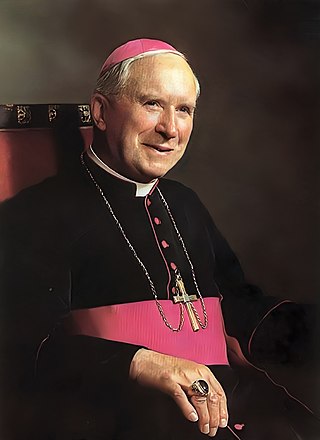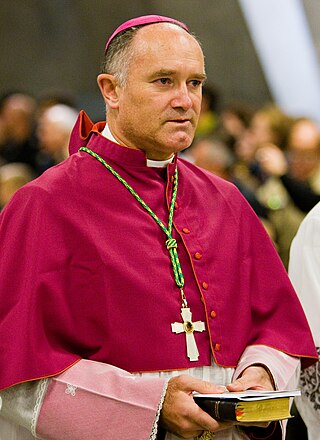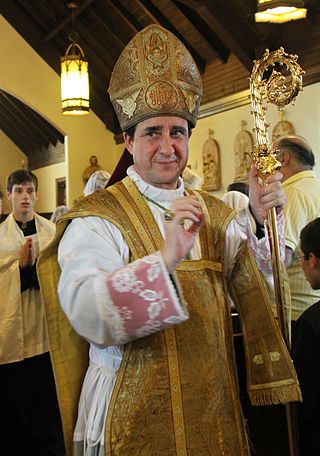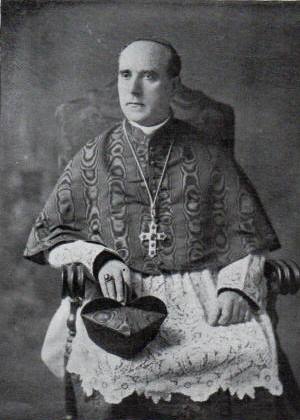
The pope, also known as the supreme pontiff, Roman pontiff or sovereign pontiff, is the bishop of Rome, head of the worldwide Catholic Church, and has also served as the head of state or sovereign of the Papal States and later the Vatican City State since the eighth century. From a Catholic viewpoint, the primacy of the bishop of Rome is largely derived from his role as the apostolic successor to Saint Peter, to whom primacy was conferred by Jesus, who gave Peter the Keys of Heaven and the powers of "binding and loosing", naming him as the "rock" upon which the Church would be built. The current pope is Francis, who was elected on 13 March 2013.

Marcel François Marie Joseph Lefebvre was a French Catholic archbishop who greatly influenced modern traditional Catholicism. In 1970, he founded the Society of Saint Pius X (SSPX), a community to train seminarians, in the village of Écône, Switzerland. In 1988, he was excommunicated from the Catholic Church for consecrating four bishops against the express prohibition of Pope John Paul II.

Exsurge Domine is a papal bull promulgated on 15 June 1520 by Pope Leo X. It was written in response to the teachings of Martin Luther which opposed the views of the Catholic Church. The bull censured forty-one propositions summarised from Luther's writings, and threatened him with excommunication unless he recanted within a sixty-day period commencing upon the publication of the bull in Saxony and its neighboring regions.

Bernard Fellay is a Swiss bishop and former superior general of the Traditionalist Catholic priestly fraternity Society of Saint Pius X (SSPX). In 1988, Pope John Paul II announced that Fellay and three others were automatically excommunicated for being consecrated as bishops by Archbishop Marcel Lefebvre, an act that the Holy See described as "unlawful" and "schismatic". Archbishop Lefebvre, and Bishop Antônio de Castro Mayer who co-consecrated these four bishops, were also said to be automatically excommunicated. At that time, he was the youngest bishop of the Roman Catholic Church at 30 years old.

Alfonso de Galarreta Genua,, is a Spanish-born Argentine bishop of the Society of Saint Pius X. Bishop de Galarreta has served as the First Assistant of the Society of Saint Pius X, working under the direction of the Superior General Fr. Davide Pagliarani, since 2018. In addition to this, Bishop de Galaretta has been the President of the SSPX—Vatican Commission since 2009, which directs the Society's correspondence with the Holy See.

Antônio de Castro Mayer was a Brazilian prelate of the Roman Catholic Church. A Traditionalist Catholic and ally of Archbishop Marcel Lefebvre, he was Bishop of Campos from 1949 until his resignation in 1981.
Ecclesiastical jurisdiction signifies jurisdiction by church leaders over other church leaders and over the laity.
Latae sententiae and ferendae sententiae are ways sentences are imposed in the Catholic Church in its canon law.
In Coena Domini was a recurrent papal bull between 1363 and 1770, so called from its opening words, formerly issued annually on Holy Thursday, or later on Easter Monday.
The Declaration on Masonic Associations is a declaration by the Congregation for the Doctrine of the Faith re-iterating the prohibition of Catholics from joining Masonic organizations. Its Latin title is Declaratio de associationibus massonicis. The document states that Catholics who join Masonic organizations are in a state of grave sin and may not receive Holy Communion. It was issued in 1983 by the prefect of the congregation, Joseph Cardinal Ratzinger, who became Pope Benedict XVI on April 19, 2005.

The Écône consecrations were Catholic episcopal consecrations in Écône, Switzerland, on 30 June 1988 performed by Archbishop Marcel Lefebvre and Bishop Antônio de Castro Mayer. The bishops consecrated were four priests of Lefebvre's Society of Saint Pius X (SSPX). The consecrations, performed against the explicit orders of Pope John Paul II, represented a milestone in the troubled relationship of Lefebvre and the SSPX with the Church leadership. The Holy See's Congregation for Bishops issued a decree signed by its Prefect Cardinal Bernardin Gantin declaring that Lefebvre had incurred automatic excommunication by consecrating the bishops without papal consent, thus putting himself and his followers in schism.

Giovanni Tacci Porcelli known as Giovanni Tacci was an Italian prelate of the Catholic Church who was Bishop of Città della Pieve for twenty years, then a papal ambassador, and finally secretary of the Congregation for the Oriental Churches from 1922 to 1927. He was made a cardinal in 1921.
Ad Apostolorum principis is an encyclical of Pope Pius XII on Communism and the Church in China. It describes systematic persecutions of bishops, priests, religious and faithful and the attempts of the government to establish a patriotic Catholic Church, independent of Rome.
Reserved cases or reserved sins is a term of Catholic doctrine, used for sins whose absolution is not within the power of every confessor, but is reserved to himself by the superior of the confessor, or only specially granted to some other confessor by that superior.
De delictis gravioribus is a letter written on 18 May 2001 by Cardinal Joseph Ratzinger, Prefect of the Congregation for the Doctrine of the Faith, to all the Bishops of the Catholic Church and the other Ordinaries concerned, including those of the Eastern Catholic Churches.

An Act against the bringing in and putting in execution of bulls writings or instruments and other superstitious things from the See of Rome, also known as Bulls, etc., from Rome Act 1571, was an Act of the Parliament of England during the English Reformation. The Act punished with high treason those who published papal bulls and Roman Catholic priests and their converts. This Act was a response to Pope Pius V's Regnans in Excelsis.
In the canon law of the Catholic Church, excommunication is a form of censure. In the formal sense of the term, excommunication includes being barred not only from the sacraments but also from the fellowship of Christian baptism. The principal and severest censure, excommunication presupposes guilt; and being the most serious penalty that the Catholic Church can inflict, it supposes a grave offense. The excommunicated person is considered by Catholic ecclesiastical authority as an exile from the Church, for a time at least.
A censure, in the canon law of the Catholic Church, is a medicinal and spiritual punishment imposed by the church on a baptized, delinquent, and contumacious person, by which he is deprived, either wholly or in part, of the use of certain spiritual goods, until he recovers from his contumacy.These goods can encompass access to the sacraments, participation in certain liturgical activities, and involvement in ecclesiastical functions.
The following outline is provided as an overview of and topical guide to the canon law of the Catholic Church:








